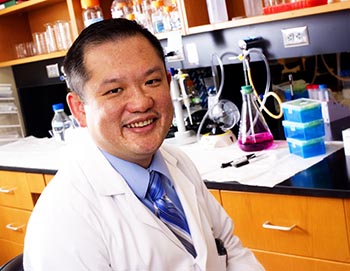 HER2-positive breast cancer tests positive for a protein called human epidermal growth factor receptor 2 (HER2), which promotes the growth of cancer cells. HER2-positive breast cancers tend to be more aggressive than other types of breast cancer.
HER2-positive breast cancer tests positive for a protein called human epidermal growth factor receptor 2 (HER2), which promotes the growth of cancer cells. HER2-positive breast cancers tend to be more aggressive than other types of breast cancer.Once a tumor is determined as HER2-positive, women are treated with very specific therapies. However, many women with this form of cancer either fail to respond to these targeted therapies or initially respond but then become resistant to these treatments.
Yang’s research focuses on a highly publicized new class of drug known as PARP (Poly ADP ribose polymerase) inhibitors that interfere with a cancer cell’s ability to repair DNA damage, hastening cell death. PARP inhibitors are in clinical trials to treat breast and ovarian cancers linked with inherited mutations in the BRCA genes, which are particularly prone to DNA damage.
Yang, an associate scientist at the UAB Comprehensive Cancer Center, has found in prior studies that HER2-positive breast cancer cells were indeed sensitive to PARP inhibitors, both in culture and when transplanted into mice.
“The surprise was that these HER2-positive tumors did not harbor any mutations in the BRCA genes and were quite sensitive to PARP inhibitors alone, independent of a DNA repair defect,” said Yang. “This means there may be other mechanisms, outside of DNA repair, that dictate the sensitivity of a tumor to PARP inhibitors.”
In the next stage of research, Yang and his team are going to further assess the interplay between PARP and other signaling pathways that could dictate the unexpected PARP-inhibitor sensitivity in HER2-positive tumor cells.
“We want to know how and why HER2 expression itself is sufficient to convert tumor sensitivity to the PARP inhibitors without altering DNA repair,” Yang said. “We also want to test whether utilizing PARP inhibitors can prevent the recurrence of cancer.
“We are so thankful for this award from Komen, as it will support our research that may greatly impact the treatment of HER2-positive breast cancers, including those that are resistant to current therapies today,” he said. “If we are successful, the findings from this study can easily be translated to the clinic and may lead to a new treatment paradigm.”